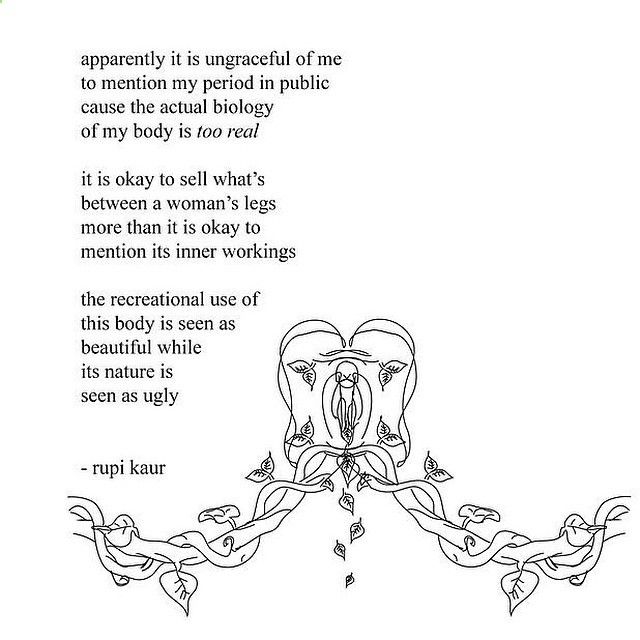
I ran to the phone and called my best friend to share my exciting news: “Hi, can I speak to Ana?!”
I was the last one to have my period amongst all my friends, so you can imagine when it eventually happened that I screamed from excitement in the toilet.
Ana’s mom picked up, and from my voice she could tell it was important. She asked me calmly:
“Yes, but oh my god, did something happen?”
And because I couldn’t hold my excitement I screamed to her:
“Yes! I got my period and I so wanted to share it with Ana!”
First, I heard silence and then suddenly she said:
“You know young lady, I must tell you it’s the least proper thing to do. It is private information that no one would be interested in and it’s nothing to be so proud of. You better go and clean yourself in the shower.”
And she hung up the phone. She actually just hung up!
The level of shame, embarrassment, and guilt I went through afterward is indescribable.
I never spoke about it with Ana, nor with any other girlfriends. For me, this is when “the whispering” started. The message I got was that it’s something to hide. And I can imagine how much easier it could have been if we had shared with each other, if we knew we could talk about it. We were all going through the same processes of humiliation.
The boys would be laughing at us if they saw a pad in our bags. And even if we went to a bathroom just to pee, we would hear the laughter: “You have a red stain on your bum!” Which for me personally, was an excuse to punch them. And I always did. But for some other girls, it was a reason to end up depressed.
The same happened during gymnastics, when we had to say that we cannot participate “because…” and were never able to finish the sentence. The teacher never supported us in finishing that either. That was actually the end of the sentence.
When I was older and had a boyfriend, I wouldn’t even meet him when menstruating. Not only because I wouldn’t make love to him, but also because I felt so disgusting and dirty. I wouldn’t want to be seen. Also, I was ashamed, and thought once he finds out, I will not be attractive to him. I never actually talked about it with him, but it was obvious for me.
Years after that, I dared to speak about my bleeding with my partner just to find out that it’s okay for him to touch me or make love, even if I am I’m having my period—which was shocking for me. And took me a long time to overcome my shame and disgust, and to believe that he can be still turned on by me when “that” was happening. The next stage was finding out that the period is called “moon days” in some traditions, which made such a difference to me.
For a long time, I judged and blamed our mothers, grandmothers, friends’ mothers, teachers, and the whole society for creating this trauma. It felt so cruel and unfair. How could they allow us to suffer like that? To hide our whole femininity, our treasure, our power! And we believed them, that we are not worthy, that we are dirty and weak. How could they not take care of it?! It was their responsibility to do that.
And you know what? One day I realised, the answer is: evolution. And, you’ll ask me: what?!
Let me explain.
They simply didn’t know. They had no idea how important it is because the collective consciousness was in a different place than it is right now. And you know why is it in a different place just now? Thanks to them! They had to let us experience it, so we could move and make a change.
Remember how not even 50 years ago people were smoking everywhere and cigarettes were advertised even by sportsmen. The biggest world champions were convincing us on TV that is so healthy to smoke cigarettes.
Years later, when we had more data and research about smoking, we realised it’s actually causing damage. But how could they know? Thanks to the ones who “tested it.” Those who (were) sacrificed for the purpose of collective knowledge. Whether they knew what they were doing or not in terms of evolution—those who smoked and died of cancer or other diseases did so that we may now know. Now our knowledge is better. Would you still blame them?
My mom’s generation was told that kids need to drink milk. As much milk as possible. So, we all had to drink it. Twenty years later we are now told, “no cows milk—only vegan milk!” So my kids drink rice, almond, or oat milk, but guess what might happen next…
Recently I told them, “Listen to your bodies more than what people say, because in the next 10 years you might find out that plant milks are also bad!”
I’ve been a mom for 13 years now. Even looking 10 years back, I see how I was doing things that I am not proud of today, because I simply had no idea they were bad for my kids. So, who am I to judge the generations before me. I am actually standing on their shoulders to be able to see and know more. Standing on their shoulders, their experience, and their mistakes. Just like our kids will be standing on ours.
And it isn’t because of anyone. It is actually thanks to those who came before us.
So, now we know that the level of shame that we carry as women around our femininity and our bleeding is really damaging. We don’t even realise that repressing this part of us, by pretending this subject doesn’t exist, not only harms us emotionally but also can create a lot of physical damage. In traditional Chinese medicine, they say it can be a source of irregular cycles, painful menstruation, and even depression!
It’s our birthright to be celebrated as women. It is crucial to do it for ourselves and for each other. And to teach the younger girls how to do it. To help them realise that becoming a woman is something to be proud of—not ashamed of. It will build a foundation for them for their sense of uniqueness and self-love. It’s a gift for their whole life.
In many cultures, there are different ceremonies, all celebrated beautifully.
Just after I turned 30, I had an amazing celebration from a Bengal tribe with my beloved, because I just had my moon days. It was the most precious gift I have received in my life. In their tradition, when a daughter is born, the family starts saving all their money until she becomes a woman, and then they organise an enormous fiesta just to celebrate her. Carrying her, throwing flower petals, dancing, and singing.
And now, being a mom of a daughter who became a young lady, I had a chance to change our history. So I did.
Based on all I’ve learned and experienced as a child, as a teenager, and as a young woman, I gathered all the wise women I knew—and we organised a party to celebrate her. For me as a mother, it feels like an honour, and a big responsibility, to transmit to my daughters what it means to be a woman.
And I can tell you, this party was a huge event not only for my little girl. We all went through a sort of healing from of all we were “fed” about our moon days as girls. We held each other and we cried together. To forgive. To move on. To make a change.
And it is a gift that I know now. And one I can pass on to our next generations. And, by the way, they will also learn from my mistakes.
~
“I bleed each month to help make humankind a possibility. My womb is home to the divine. A source of life for our species. Whether I choose to create or not. But very few times it is seen that way. In older civilizations this blood was considered holy. In some it still is. But a majority of people. Societies. And communities shun this natural process. Some are more comfortable with the pornification of women. The sexualization of women. The violence and degradation of women than this. They cannot be bothered to express their disgust about all that. But will be angered and bothered by this. We menstruate and they see it as dirty. Attention seeking. Sick. A burden. As if this process is less natural than breathing. As if it is not a bridge between this universe and the last. As if this process is not love. Labor. Life. Selfless and strikingly beautiful. “ ~ Rupi Kaur












Read 0 comments and reply